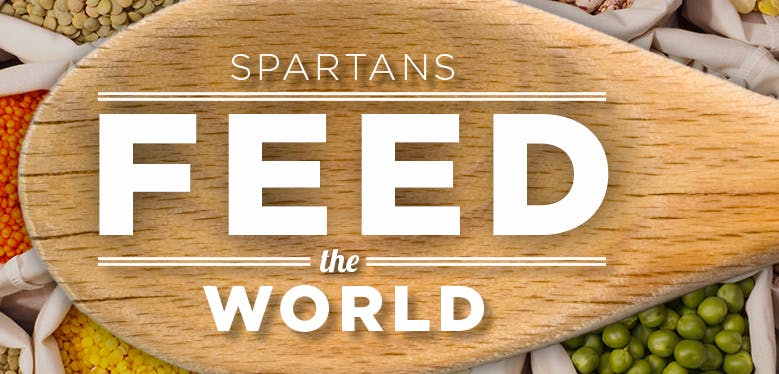The Earth’s population is increasing at an exponential rate. According to the Population Reference Bureau, our projected population by the year 2050 is expected to be 9.8 billion. World hunger is already a prevalent issue in today’s society and MSU is taking charge by participating in the Feed the World initiative to ultimately help find a solution to this seemingly never ending issue.
Feed the Future is the U.S. Government’s global hunger and food security initiative that aims to help solve the issue of world hunger. According to MSU Today, food production will need to increase by 70 to 100 percent to keep up with the growing population.
“By 2050, our population will be around 9 billion. Our agricultural production capacity has not been increasing at a rate fast enough to meet the future demand. This simply does not add up,” Engineers for a Sustainable World President Nicole Kruse said. “In addition, the UN predicts our water demand to increase by 55% in 2050, even though there is already an estimated (one) billion people without access to safe drinking water.”
MSU is lending a hand to the federal government by creating the Feed the Future Innovation Lab for Food Security Policy led by MSU’s Food Security Group in partnership with the International Food Policy Research Institute and South Africa’s University of Pretoria.
The innovation lab’s purpose is to increase the efficiency of small-farm owners production of beans and other grain legumes, such as cowpeas and chickpeas — as well as improving the quality of diets within poor demographics in regions such as Central America and sub-Saharan Africa, according to MSU Today.
Kruse believes research along with outreach are two ways to address the issue of food security.
“Even though it’s controversial, I think GMOs will be necessary to meet our food requirements. The sooner research can prove they’re not going to make people grow two heads, the better,” Kruse said.
MSU has received funding from multiple organizations in the form of grants supporting its cause, such as the U.S. Agency for International Development (USAID) with a total of $10 million, the Borlaug Higher Education Agricultural Research and Development program with about $16.3 million, and the Gates foundation with about $7.8 million.
Allison Burg, the president of the Food Science Club, and Kruse share similar views on genetically modified organisms (GMOs). They both believe GMOs are just one way that food can be produced efficiently on a large scale.
“GMOs that have higher amounts of vitamins I think could really help growing populations,” Burg said. “If we could allocate money to making crops that have a full serving of vitamin A in like a half cup of rice, and that was the only thing somebody in a third world country gets that day, that would be great.”
Support student media!
Please consider donating to The State News and help fund the future of journalism.
Discussion
Share and discuss “MSU assists in the Feed the World Initiative to help find solution to world hunger ” on social media.







